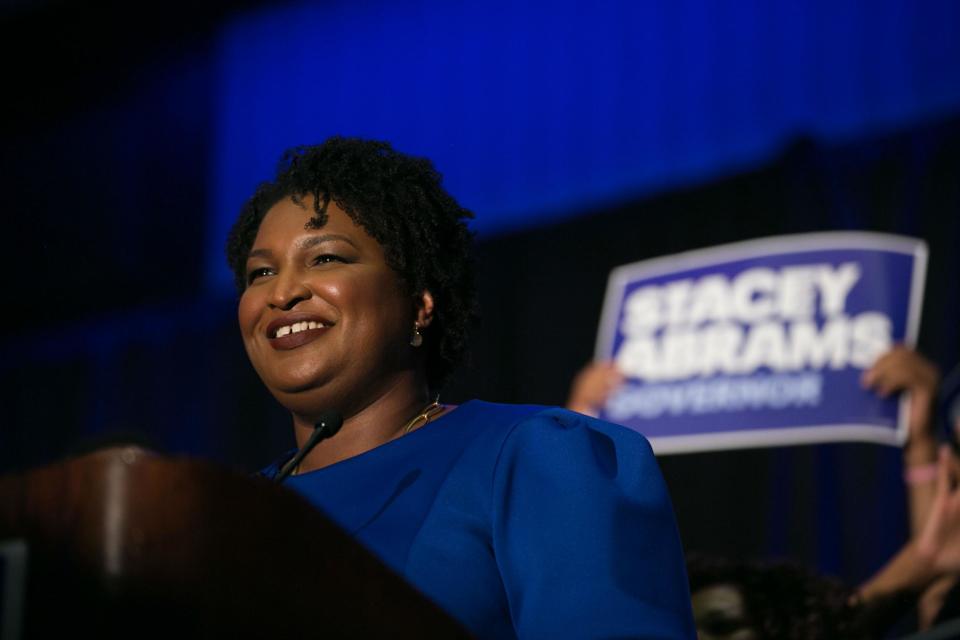Midterms 2018: The five big questions
America is poised to embark on one of the most highly-anticipated - and costliest - set of midterm elections in many years.
Democrats and Republicans between them are set to spend more than $2.5bn to elect candidates for the House of Representatives, the Senate, governors’ races, along with numerous state and local bodies.
Donald Trump's name is not on the ballot in any of these, but experts say midterm elections are frequently a national referendum on how voters judge a president’s performance. Having earlier been at at all time low, Mr Trump’s approval rating currently stands at 44 per cent, with 52 per cent disapproval, according to an average calculated by the political news site Real Clear Politics.
Against such a backdrop, here are five big questions everybody is asking:
Will the Democrats win the House?
Democrats believe they have a very real chance of securing the House, the lower chamber of congress where most legislation begins and where any attempt to impeach Mr Trump would begin. Republicans currently hold it 235-195, meaning Democrats need to flip 23 seats. They believe many educated voters, especially women, in suburban districts, who voted for the president, have been turned off by his rhetoric. The data analysis site Five Thirty Eight says there is a 6 out of 7 chance (85.9 per cent) the Democrats will win it, and a 1 in 7 chance (14.1 per cent) Republicans will hold it.
But bear in mind, nothing is certain. Plenty of the groups suggesting it more than likely the Democrats will win, gave Donald Trump almost no chance of winning in 2016. Bernie Sanders recently told supporters he was not expecting the big 'blue wave' that some have talked about.
What’s going to happen in the Senate?
While it is not inconceivable the Democrats could take the senate - currently held 51-49 by the GOP, it is more likely Republican will retain control. The reason for this is that Democrats are defending 26 seats, among them that of Mr Sanders, while Republicans are only defending nine.
Ten of the Democratic seats are in states Mr Trump won - five of those races which the president won by 19 points of more, including West Virginia and North Dakota. Meanwhile, of the nine seats being defended by Republicans, all but one one are in states Mr Trump carried. Five Thirty Eight gives the Democrats a 2 out of 9 chance of wining the senate (21.9 per cent), and the Republicans a 7 in 9 (78.1 per cent) chance of holding on to it.
Will the US elect its first black woman governor?
Few races are receiving as much scrutiny as the showdown in Georgia between Democrat Stacey Abrams and Republican Brian Kemp. If the 44-year-old, who served the minority leader of the Georgia House of Representatives from 2011 to 2017, is successful, she would become the nation’s first female black governor. (Douglas Wilder, who occupied the Virginia governor’s mansion from 1990-94, was the first African American governor since the end of the US civil war.)
She has run on a progressive platform and earlier this month accused Mr Kemp, Georgia’s secretary of state, of supporting voter ID laws that have put the voter registration applications of 53,000 on hold. She said Republicans are trying to prevent people of colour, who are more likely to support her, from voting. The Real Clear Politics average currently scores the race 47.7 - 45.7 in favour of Mr Kemp.
Meanwhile, in Vermont, Democrat Christine Hallquist is running to be the first transgender governor.
Is Ted Cruz really in danger in Texas?
In the traditionally red state of Texas, Beto O’Rourke has been securing plenty of headlines and warm praise, for his impassioned and principled challenge for Republican senator Ted Cruz. Video footage of the 46-year-old congressman and onetime punk rocker defending NFL player Colin Kaepernick’s decision to kneel during the national anthem to protest the treatment of people of colour, went viral.
People saw in Mr O’Rourke someone unafraid to talk about the big issues Democrats sometimes steer away from - he is one of few Democrats openly supporting the impeachment of Mr Trump - and a possible presidential contender sometime down the road. But while some early polls put the two men in a virtual tie, the latest Real Clear Politics average gives Mr Cruz a seven point lead. Should the 47-year-old Mr Cruz lose, it would be a humiliation for a man who once had presidential ambitions and who was the de facto runner up to Mr Trump in the 2016 Republican primary.
Is America about to break a record on female winners?
A recent survey suggested a record 100 women candidates could be returned to the House of Representatives this autumn. The NBC analysis suggested an additional 30 and 40 women are expected to join the house, almost all of them Democrats.
The analysis came after the recent controversial confirmation process for Supreme Court justice Brett Kavanaugh, and observers said this year’s female wave was expected to exceed even that of 1992’s so-called Year of the Woman, when 24 new women joined the congress, setting what was then a new record. That was partly the result of a backlash against Clarence Thomas's Supreme Court confirmation.

 Yahoo News
Yahoo News 

